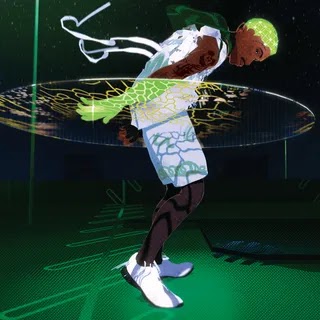The rapper’s latest is a cosmic synthesis of EDM, emo rap, and cutesy pop refrains that echoes the rave fantasies of Drain Gang.
Over the years, Jazz Butler has reset his career numerous times: In 2016, when he changed his professional moniker from Yung Bruh to Lil Tracy, but also more existentially following the tragic loss of his right-hand collaborator Lil Peep in 2017. At times, he’s drifted toward a more mainstream rap career—2020’s Designer Talk 2 featured the likes of Pi’erre Bourne, Chief Keef, and the late Lil Keed, and 2018’s country-tinged “Like a Farmer” had viral novelty potential a few months before “Old Town Road” eclipsed it entirely. But whenever the road seems clear and charted, Lil Tracy seems to swerve unexpectedly left. 2019’s Anarchy was on-the-nose pop-punk pastiche that could have been ghost-produced by Travis Barker; Designer Talk 2 demonstrated how well Tracy’s sensitive falsetto can blend with a more straightforward trap sound. His new album Saturn Child is comparatively much harder to classify, and more singular—a cosmic synthesis of EDM, emo rap, and cutesy pop refrains that’s maybe the closest an American rapper has come to replicating the rave fantasies and euphoria of Drain Gang.
Regardless of his sonic evolutions, Tracy’s soul is still the same: an aching romantic with a perpetually broken heart and a penchant for toxic love affairs. He’s largely been defined by his relationships with other people; it’s almost impossible to find a review or profile that doesn’t mention his close artistic kinship with Lil Peep, or his notable parents, Ishmael Butler of Shabazz Palaces and Digable Planets and Cheryl Gamble of SWV. Because Tracy is so often viewed through his external relationships, the fact that Saturn Child has no features demonstrates an artist asserting his voice on its own terms. Tracy’s early delivery was often abrasive and buried in Auto-Tune but he’s become a more confident vocalist, with a sing-song flow that feels effortless, even soothing. At times his voice tilts toward the cartoonish, but his delivery is grounded by the catchiness of his choruses—he invokes the nasal whine of Blink-182, the sultry falsetto of The Weeknd, and the cartoonishness of iLoveMakonnen. Though not quite on the full-blown Jaden Smith indigo child tip, Tracy weaves a loose aesthetic of astrological and intergalactic imagery into his tales of material gain and emotional loss: “I feel like Saturn/I got rings,” he raps on “Touche.”
Recurring members of the Gothboiclique universe like Smokeasac, Bighead, and BetterOffDead all turn in production work, but Tracy also recruits a number of younger and lesser-known beatmakers, particularly for drill-flavored tracks like “Location” and “Roadrage”—evidence of an artist with his ear to the underground. On Saturn Child, Tracy’s alt-influenced sound is reconfigured and retrofitted, creating a sound that’s on a more astronomical wavelength. Tracks like “It Is What It Is” have the heavily synthesized, sci-fi flavor of Pi’erre Bourne and Working on Dying. On “Heavenly,” Tracy abandons the direct rock signifiers but keeps the pop-punk flow, going in over a wonky dubstep beat. “Roadrage” updates the Gothboiclique sound, marrying an emo-tinged guitar line to a bassy Brooklyn drill beat. “Knight in Shining Armor” and “Heavenly” each briefly break into a heavy kicking beat that splits the difference between synth-pop and hardstyle rave.
Within a single song, Lil Tracy changes his skin and shifts into unpredictable shapes. On “Knight in Shining Armor” as Tracy croons about broken hearts and fake friends, the beat mutates beyond his control. An opening crest of synths gives way to dubstep bass, which is soon overtaken by a stomping rave four-on-the-floor, but all the while, Tracy’s angelic delivery remains a guiding star. It’s impossible to call Saturn Child Lil Tracy’s final form, given his many reinventions, but it’s a variant that sounds more comfortable and confident than ever before.



0 comments:
Post a Comment